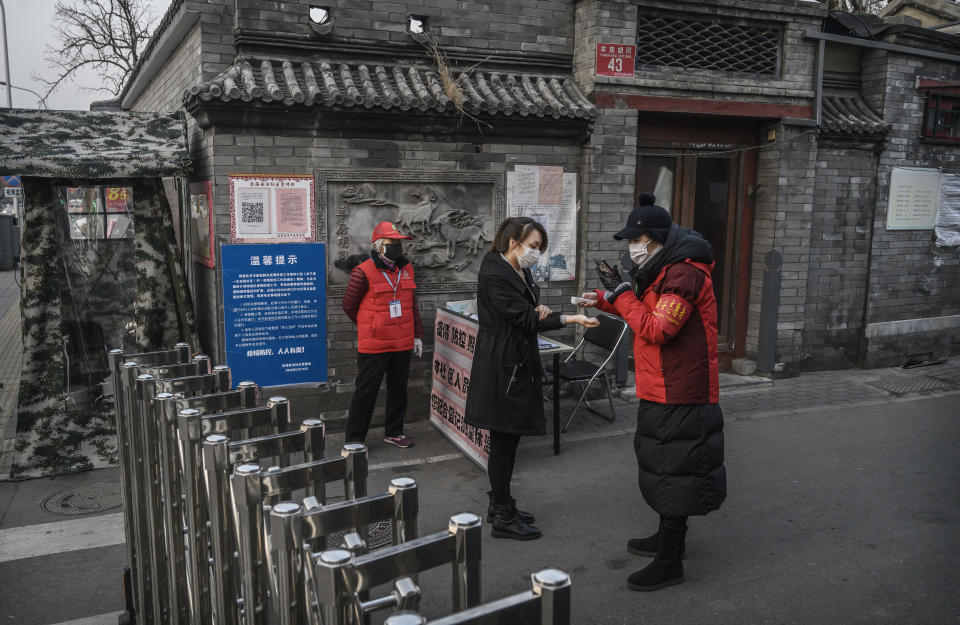Coronavirus' biggest winners: Tech providers in China, Hong Kong
The coronavirus outbreak is roiling China, but some startup technology companies are actually benefiting as isolated citizens flock to a range of solutions to achieve a sense of normalcy.
With the world’s second largest economy largely isolated amid over 75,000 infections and more than 2,000 deaths, remote services, robots, artificial intelligence and video chat are among the unlikely winners of a crisis that’s reverberated across the globe.
For example, Chinese online retail giants Alibaba (BABA) and JD.com (JD) have actually hired workers; meanwhile, anecdotal evidence suggests that sectors like telehealth, online fitness and online business meetings have helped provide relief and a needed diversion for those quarantined in mainland China, as well as in Hong Kong.
In spite of a warning from Apple (AAPL) that spooked investors, the tech sector may get a boost from the outbreak. "Within tech and communication services, software and services and internet industries should perform better in this environment,” UBS Global Wealth Management's Chief Investment Officer Mark Haefele said in a note to clients this week.
It’s consistent with what International Monetary Fund researchers once described as the unequal distribution of an outbreak’s economic effects.
“Some sectors may even benefit financially, while others will suffer disproportionately,” IMF economists wrote in a 2018 study on epidemics.
“Pharmaceutical companies that produce vaccines, antibiotics, or other products needed for outbreak response are potential beneficiaries. Health and life insurance companies are likely to bear heavy costs, at least in the short term, as are livestock producers in the event of an outbreak linked to animals,” the paper added — even though the poor and elderly are more vulnerable when a disease rampages through a country.

The internet has played a vital role in the crisis, even though China is notorious for censoring content.
Sharing visuals from the empty streets and malls of affected area was a way to understand the impact of the virus, and underline technology’s critical role as events have played out.
Also, there has been significant contribution from citizen journalists — some of whom are now missing — who shared on-the-ground views of the hospitals and clinics, revealing the strain of the virus on frontline workers.
Yet tech has been used for other beneficial purposes. Videos from China and reports from Israel reveal the expanding use of telemedicine and robots for remote monitoring and remote care to help protect frontline health workers from exposure.
Ping An, one of China’s largest insurers, has been using its Good Doctor platform to help.
“They have now more than 300 million users on their platform in China [and] they are a key to responding to the coronavirus outbreak,” Jeremie Capron, director of research at ROBO Global, told Yahoo Finance recently.
But technology has also turned into a source of biding the time while under quarantine — which has becoming increasingly stringent. In Wuhan for example, only one family member is allowed to go out for supplies and groceries once every three days.
Staying indoors doesn't mean neglecting fitness. Beijingers are going online for fitness classes amid the #coronavirus outbreak. pic.twitter.com/9WOeBfoqKG
— SCMP News (@SCMPNews) February 18, 2020
The uses range from Tencent offering free game time to online workouts. There have also been reports of increased online shopping — which increased the demand for workers at JD.com and Alibaba warehouses. This comes as the manufacturing sector, which supplies major tech companies, is feeling the crunch from fewer migrant workers.
But there is also some anxiety about the use of technology, especially in a country like China where censorship is already a factor.
Reports of Chinese concerned by the use of surveillance technology to help track the movement of the virus, such as a “close contact detector” app. It has some worried there could be negative unintended consequences, or adverse consequences from government officials that could track a person’s whereabouts.
There continue to be attempts to share on-the-ground stories of the outbreak, amid a government crackdown of information that is also being blamed for contributing to the spread of the virus.
ROBO’s Capron said there are ample opportunities for AI, telehealth and other technologies, as the outbreak continues to disrupt daily life.
“If you step back and look at the big picture numbers, the use of technology in health care... is still fairly limited,” he said. “Health care is one of the big economic sectors that (has) one of the lowest levels of digitization.”
U.S.-based telehealth company Teladoc and China’s Ping An Good Doctor are examples, as frontline health workers are under pressure in both China and Hong Kong.
Ping An has already seen a jump in its users, amid the outbreak and the South China Morning Post reported that founding chairman, Peter Ma Mingzhe, said there would be more investment in the platform.
“This fight against the outbreak highlights the importance of technology to the transformation of the country and industries,” he said.
Capron said Ping An and others are providing a strong use case for the technology amid the outbreak.
Anjalee Khemlani is a reporter at Yahoo Finance. Follow her on Twitter: @AnjKhem
Read the latest financial and business news from Yahoo Finance
Follow Yahoo Finance on Twitter, Facebook, Instagram, Flipboard, SmartNews, LinkedIn, YouTube, and reddit.
